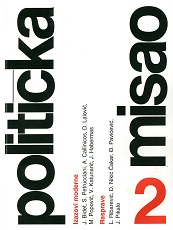Kolektivna prava nacionalnih manjina i liberalno načelo
COLLECTIVE RIGHTS OF ETHNIC MINORITIES AND THE LIBERAL PRINCIPLE
Author(s): Radmila VasićSubject(s): Law, Constitution, Jurisprudence
Published by: Fakultet političkih znanosti u Zagrebu
Keywords: collective rights; ethnic minorities; liberal principle; individual rights; universal equality
Summary/Abstract: The understanding and clarification of important social events as themes must be derived from the hermeneutic code of the epoch. The millennial threshold was marked by processes of integration and particularisation, which were observed, as constitutive principle or principle of legitimate refutation, also in the bringing down of socialist orders and the establishment of supranational associations. Thus a discussion of the (empirical) position and (normative) status of ethnic minorities must as well be positioned in a universal European context, in which the predominant role is played by liberal theory and liberal practice. In societies going through transformation from ideological to legal state, answers to multi-ethnic needs must be sought in the patterns of liberal philosophy, taking into account (a) the delusion of Western theory that the change of regime brings about a spontaneous springing up of liberal institutions from the socialist ruins, and (b) the possible disproof of the assertion that the recognition of collective rights of ethnic minorities violates the liberal principle of universal equality of citizens as abstract members of the state. On the other hand, it is necessary to understand and acknowledge the historical heritage when solving the issue of ethnic minority rights in the countries of Eastern and Central Europe, since the issue was absorbed in their authoritarian past by the ideological supranational programme. All the falsity of the “state of peoples and ethnicities” was fully exposed at the outset of transition, when the regime crisis arose coupled with the crisis of state identity. The states which divided themselves and seceded did fall apart exactly along the lines of the ethnic components. It is precisely in view of the described experience (along with the “surplus of violence” syndrome) that the post-Yugoslavian consolidation necessarily requires institutional guarantee and practical recognition of particular ethnic identities.
Journal: Politička Misao
- Issue Year: XLIX/2012
- Issue No: 02
- Page Range: 131-149
- Page Count: 19
- Language: Serbian

